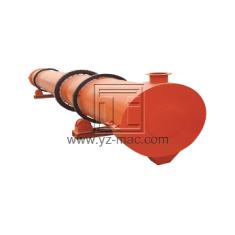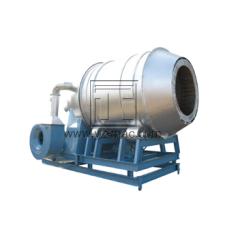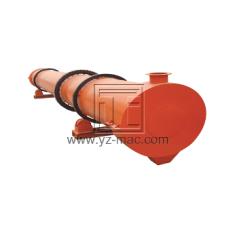Compost fertilizer making machine
A compost fertilizer making machine, also known as a compost fertilizer production line or composting equipment, is specialized machinery designed to convert organic waste into high-quality compost fertilizer. These machines streamline the process of composting and fertilizer production, ensuring efficient decomposition and the transformation of organic waste into nutrient-rich fertilizer.
Efficient Composting Process:
Compost fertilizer making machines are designed to accelerate the composting process, significantly reducing the time required for decomposition. These machines provide optimal conditions for microbial activity, promoting efficient breakdown of organic materials and enhancing composting speed. They ensure that the composting process is completed in a shorter timeframe compared to traditional composting methods.
Integrated Design:
Compost fertilizer making machines often consist of multiple components integrated into a production line. These components may include shredders, mixers, compost turners, granulators, drying systems, and screening equipment. The integrated design ensures a streamlined and continuous operation, facilitating the transformation of raw organic waste into high-quality compost fertilizer.
Customized Fertilizer Formulations:
Compost fertilizer making machines allow for the customization of fertilizer formulations based on specific crop and soil requirements. These machines enable the blending of compost with additional nutrients, such as micronutrients or specific ratios of NPK (nitrogen, phosphorus, and potassium). Customized formulations ensure that the resulting compost fertilizer meets the nutritional needs of different plants and enhances soil fertility.
Nutrient Retention:
Compost fertilizer making machines optimize the retention of nutrients during the composting process. By controlling factors such as temperature, moisture, and aeration, these machines minimize nutrient losses and maximize nutrient content in the final compost fertilizer. Nutrient retention ensures that the fertilizer produced is rich in essential elements for plant growth.
Reduction of Environmental Impact:
Using compost fertilizer making machines contributes to sustainable waste management practices and reduces environmental impact. These machines help divert organic waste from landfills, reducing methane emissions and environmental pollution. By transforming organic waste into compost fertilizer, they provide a natural and organic alternative to synthetic fertilizers, promoting environmental sustainability.
Cost Savings:
Compost fertilizer making machines can result in cost savings for agricultural operations. By producing compost fertilizer on-site, farmers can reduce the need for external fertilizer purchases, thereby lowering input costs. Additionally, compost fertilizer making machines utilize organic waste materials that would otherwise be discarded, providing a cost-effective solution for waste management.
Improved Soil Health and Crop Yield:
Applying compost fertilizer produced by these machines improves soil fertility, structure, and nutrient availability. The organic matter and beneficial microorganisms in the compost enhance soil health, promoting the growth of healthy roots and improving water-holding capacity. As a result, crop yield, quality, and overall plant health are improved, leading to sustainable and productive agricultural practices.
Versatility and Scalability:
Compost fertilizer making machines come in various sizes and capacities, catering to different scales of compost production. Whether for small-scale farms, community composting, or large commercial operations, these machines offer versatility and scalability. They can be adjusted to meet the specific needs and volumes of organic waste and fertilizer production.
In conclusion, compost fertilizer making machines are essential tools for transforming organic waste into nutrient-rich compost fertilizer. These machines optimize the composting process, enable customization of fertilizer formulations, and contribute to sustainable waste management practices. By utilizing compost fertilizer making machines, agricultural operations can achieve cost savings, reduce environmental impact, and improve soil health and crop productivity.







